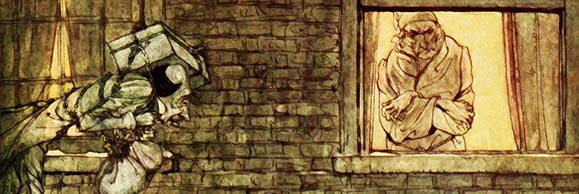As Christmas approaches it seems a good time to remember the humble beginnings of the Insolvent Debtors Act 1813 and how life has improved since. Envisage if you will, the early Victorian period of ‘A Christmas Carol’ by Charles Dickens. A story still recalled each Christmas of a bitter old miser ‘Ebenezer Scrooge’ and his transformation into a more social, caring man after ghostly visits from his dead partner Jacob Marley.

Revered the world over, Charles Dickens the author of ‘A Christmas Carol’ was a man who understood debt and misery. His own father had been locked up in a Debtors prison with his mother and youngest sibling (as was the custom then) and he himself had to live in the house of an Agent for the Insolvent Court. At the tender age of 12 years, Charles Dickens had to sell his life things and work a ten hour day in a rat infested blacking factory.
His experiences at this dark time shaped his life, relationships and future writings. For instance his subsequent, dis-satisfied attitude towards women is believed to be an acidic overhang from his mother failing to fetch him home in better times. And although not directly referenced in ‘A Christmas Carol’, it is thought that Charles ‘dual’ relationship with his father, who he both loved and demonised at that time, shaped the character of infamous Ebenezer Scrooge.
It’s hard to think things could have been any worse, but had it not been for the then recent Insolvent Debtors Act, Charles father could have been locked up indefinitely. As it was, those imprisoned for debt could apply to the court to be released by reaching agreement with their creditors. That agreement for John Dickens was in the shape of £450 bequeathed to him by his grandmother after she died and that he used to pay his creditors.
What would the remainder of Charles life have been like and that of his seven brothers and sisters without the Insolvent Debtors Act? One would like to think it wouldn’t still involve incarcerating families.



